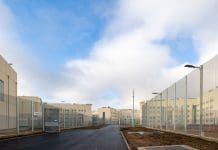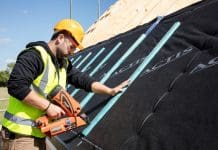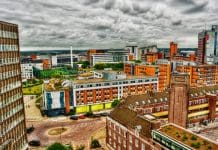With 700,000 hotels and resorts worldwide, the decarbonisation of the leisure sector’s existing estate will be crucial in meeting net zero targets. Simon Gill, hotels and leisure business leader at Arup, discusses a new report exploring how this can be achieved
With the Antarctic recently recording a new record high temperature of 18.3C, it cannot be denied that this decade needs to be one of urgent climate action. Without making drastic steps now, we will not achieve net zero carbon targets set for 2050 and thus, will be unable to avoid irreversible damage to our planet. It is therefore integral that all sectors make considerate and consistent changes to their business strategies to align with, and support, greater sustainable action.
The hospitality industry is no exception to this. With over 700,000 hotels and resorts worldwide and hotels responsible for roughly 2% of global greenhouse gas emissions, it is clear we must focus on the decarbonisation of existing hotels as we strive towards a net zero future.
To investigate how the sector can bring about improved sustainability, Arup has co-authored a new report, Transforming Existing Hotels to Net Zero. This has been produced in partnership with international property consultancy Gleeds, global hospitality company IHG and energy management and automation specialist Schneider Electric. As part of this research, we drew on a real-life test premises case study to examine ways to decarbonise existing hotels and drive operational energy to net zero carbon.
Our findings are clear in highlighting dual benefits of decarbonising buildings from both an environmental and financial perspective. Further, we conclude that improving hotels’ environmental impact goes beyond encouraging positive behavioural changes and must incorporate holistic change to energy management.
Reconfiguring for the future
It is important to note that around 80% of buildings that will be in use in 2050 – the UK’s deadline to reach net zero emissions – already exist. Consequently, simply focusing on net zero carbon new buildings will not be enough to keep us on track for the targets in place to achieve a sustainable future. Energy consumption accounts for between 3%-6% of operating costs for hotels and up to 60% of emissions. Controlling and optimising operations therefore plays a major part in reducing the industry’s climate impact.
Improving operational performance requires targeting space heating and/or cooling – the largest contributor to energy emissions – followed by domestic hot water, fans and lighting. But true change can only happen through a holistic design approach to avoid weak links in the chain. For example, active measures like switching from gas-powered equipment to low carbon electricity and passive design measures such as insulation and airtightness can have a demonstrable impact.
Indirectly, these changes can also help to improve the day-to-day running of hotels and customer experience. By reducing energy demand, hotels can rely on small, cheaper heating and cooling systems, which are put under less strain and therefore have greater longevity. Saving energy can also boost guest comfort and limit noise pollution, making for a better experience and even raising the potential Revenue Per Available Room.
For hotel operators, sustainably-minded strategies are no longer seen as “nice-to-haves” but are standard expectations from corporate and leisure customers. As an important aspect of brand management, decarbonisation also makes financial sense as a result of reduced operational costs stemming from energy efficiency.
There remains a disconnect, however. Although it makes financial sense to incorporate sustainable changes to decarbonise hotels, decision-making is often influenced by a range of competing factors, such as asset value and rentable income. Within this framework, decarbonisation is often undervalued and underused. Ironically, hotels risk pre-emptively losing economic value and becoming stranded assets if a decarbonisation agenda does not take precedent in business strategies.
Applying the formula
Our research shows that not only is a decarbonised hotel a more sustainable option but also it represents a financially viable model that can be applied across the UK.
The selected case study is a typical mid-scale, full-service business or leisure hotel, built in the UK in 1966 – picked due to the potential for many hotels to copy the methodology. The target was to achieve net zero carbon in operation via a framework of gathering operational data, understanding how energy is used, creating energy and cost models based on this, and then monitoring the impact.
As it stands, the test hotel currently produces the equivalent of the carbon sequestered by 27,000 trees planted in the UK. In response, improving the management of the hotel’s carbon emissions is, simply put, the most cost-effective and easiest way to reduce them. Our investigation found that significant savings could be made without changing the core of the hotel or its services, with operational changes alone close to meeting the target for 2026 singlehandedly.
Compared with its current performance, our suggested interventions to improve the hotel’s efficiency could reduce the case study’s energy use by 40%, saving £124,000 annually and cutting carbon by 290 tonnes. These included fairly simple upgrades, such as to the air conditioning system and kitchen equipment, as well as installations of energy efficient lighting.
Recommendation
Climate change is the greatest challenge that we currently face, across every single industry. Not responding to the threat or doing so inadequately presents an environmental, reputational and commercial risk across the hotel sector and its supply chain.
Thankfully, our research shows that owners and operators have a real opportunity to reduce their carbon impact via zero carbon strategies. Not only that, but these alterations could simultaneously encourage profit margin boosts through energy savings, protect the value of assets and increase revenue by fulfilling customer preferences. It’s a win-win all round, and there is no reason to delay actively implementing these sustainable measures as soon as possible.
For further information on the case study and how you can help to drive more sustainable change in the hotel sector, download the Transforming Existing Hotels to Net Zero report here.
 Simon Gill
Simon Gill
Hotels and leisure business leader
+44 (0)1962 829 900
Twitter: @arupgroup
LinkedIn: arup
Instagram: arupgroup














